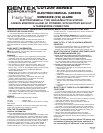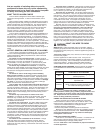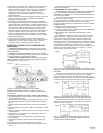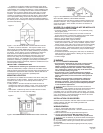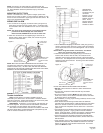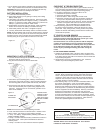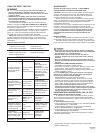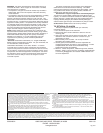
ELECTROCHEMICAL TYPE SINGLE/MULTIPLE STATION
CARBON MONOXIDE ALARM, AC POWERED, WITH BATTERY BACK-UP
& TANDEM WIRE CONNECTION
Installation Instructions - Owner's/User’s Information Manual -READ CAREFULLY AND SAVE
INTRODUCTION CO1209 SERIES
The CO1209 electrochemical carbon monoxide (CO) alarm is for
use as an evacuation device in all dwelling units. The device has a
solid state piezo signal to warn and alert the occupants to the
presence of carbon monoxide.
Your CO alarm is designed to detect abnormal amounts of
carbon monoxide gas, only. Consequently, it is uncommon for
household sources of combustion, including properly functioning
household appliances, to produce sufficient levels of CO to cause an
alarm.
BASIC SAFETY INFORMATION
Dangers, Warnings, Cautions and notices alert you to important
operating procedures or to potentially hazardous situations. Pay
special attention to these items.
WARNING!
This CO alarm is listed for use in single-family and multi-family
residences, along with hotel, motels and other dwelling units.
This CO alarm will only indicate the presence of increased levels
of carbon monoxide gas at the sensor. Increased levels of carbon
monoxide gas may be present in other areas.
This CO alarm must receive continuous 120VAC, 60Hz , pure
sine wave electrical power. (battery is meant for emergency
back-up only). In order for the emergency battery back-up to work,
a new battery must be properly installed (see BATTERY
INSTALLATION section).
NEVER ignore your CO alarm if it sounds. Refer to IF YOUR CO
ALARM SOUNDS section for more information. Failure to do so
can result in serious injury or death.
Test this device once a week. If the device ever fails to test
correctly, replace immediately! If the device is not working
properly, it can not alert you to a problem.
This product is intended for use in indoor locations of family
dwelling units. It is not designed to measure CO levels in
compliance with Occupational Safety and Health Administration
(OSHA) commercial or industrial standards. Individuals with
medical conditions that may make them more sensitive to carbon
monoxide may consider using warning devices which provide
audible and visual signals for carbon monoxide concentrations
under 30 ppm. For additional information on carbon monoxide and
your medical condition, contact your physician.
MODELS
(SEE BACK OF CO ALARM FOR EXACT MODEL)
CO1209..........................120VAC, 60Hz
CO1209F........................120VAC, 60Hz with Form A/Form C auxilary
relay contact
NOTICE: In the event AC Power fails, a 9VDC battery will provide
proper alarm operation for a minimum of 24 hours.
HOW THE CO ALARM WORKS
GENERAL INFORMATION
NOTICE: CO problems can occur at any time.
When fully powered, the device samples the air and takes a new
reading about every 30 seconds. A microchip inside the unit stores
each reading and remembers the levels of CO it has been exposed
to over time. The CO alarm will sound when it has been exposed to
a critical level of CO (measured in parts per million or ppm) within a
specified time (measured in minutes). This CO alarm features a
permanently installed sensor, an indicator light and an 85dBA,
temporal 4 alarm horn. It also has a reset feature to temporarily
CO1209 SERIES
ELECTROCHEMICAL CARBON
MONOXIDE (CO) ALARM
quiet the alarm horn. If critical levels of CO remain, the alarm will
re-activate and sound.
NOTICE: MALFUNCTION WARNING This unit performs a self-
diagnostic test. If the alarm malfunctions it should be replaced
immediately. See IF THE CO ALARM IS NOT OPERATING
PROPERLY for more information.
HOW TO TELL IF THE CO ALARM IS WORKING
PROPERLY
Your device is provided with an alarm horn and flashing red Light
Emitting Diode (LED) indicator, which flashes every 15-30
seconds, and a green AC power on LED and red LED for CO.
WHAT YOU CAN DO TO MAKE YOUR FAMILY SAFE
FROM CARBON MONOXIDE (CO)
a. Install CO alarms properly following the instructions in
this manual. Keep your units clean. Test your CO alarm
weekly and replace when it no longer functions.
As with any electronic product, CO alarms have a limited life,
it is recommended that CO alarms be replaced every five (5)
years. CO alarms that don't work cannot protect you.
b. Develop a family escape plan and practice it with your
entire family, especially small children.
Draw and post a floor plan of your home and find ways to
exit from each room.
Teach children what the CO alarm signal means, and that
they must be prepared to leave the residence by themselves
if necessary.
Decide on a meeting place a safe distance from your house and
make sure that all your children understand that they should go
and wait for you if there is a CO alarm.
Hold CO drills at least every 6 months to make sure that
everyone, even small children, know what to do to escape
safely.
Know where to go to call the fire department from outside your
residence.
WHAT TO DO IF THERE IS A CO EMERGENCY IN
YOUR HOME
If you have prepared family escape plans and practiced them with
your family, you have increased their chances of escaping safely.
Review the following rules with your children when you have CO
drills so everyone will remember them in a real CO emergency. If
alarm should sound:
a. Don't panic; stay calm. Your safe escape may depend on thinking
clearly and remembering what you have practiced.
b. Open windows or doors. Opening windows or doors can
significantly reduce CO levels.
c. Get out of the house following a planned escape route as quickly
as possible. Do not stop to collect anything or to get dressed.
d. Meet at your prearranged meeting place after leaving the house.
e. Call the Fire Department as soon as possible from outside your
house. Give the address and your name.
f. Never re-enter the building while the device is in alarm.
Contact your local Fire Department for more information on
making your home safer from CO and about preparing your family's
escape plans.
NOTE: Current studies have shown CO alarms may
not awaken all sleeping individuals, and that it is
the responsibility of individuals in the household
550-0498
Pg. C-1



